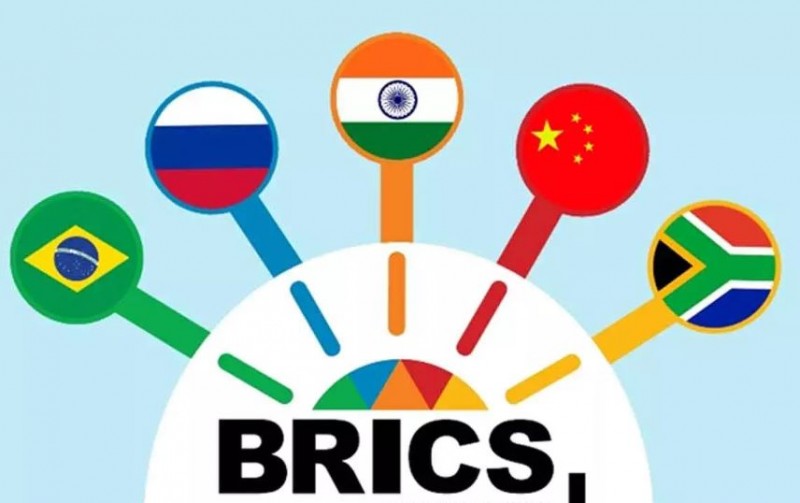
SOUTH AFRICA: The five-nation BRICS (Brazil, Russia, India, China, and South Africa) grouping on Friday, June 2 pledged to combat terrorism in all its forms and manifestations, including the cross-border movement of terrorists, and terror financing networks and safe havens, a veiled reference to Pakistan.
The foreign ministers of the BRICS nations issued a joint statement titled "The Cape of Good Hope" in which they vehemently condemned terrorism "whenever, wherever, and by whomsoever committed." The joint statement from the ministers stated that "they (ministers) are committed to combating terrorism in all its forms and manifestations, including the cross-border movement of terrorists, as well as terrorism financing networks and safe havens."
Although no nation was specifically mentioned in the joint declaration, India has previously referred to Pakistan as the "epicentre of terrorism," where terrorists like Hafiz Saeed, Masood Azhar, Sajid Mir, and Dawood Ibrahim are protected.
The ministers emphasised the need for a comprehensive approach from the entire international community to effectively curtail terrorist activities, which pose a serious threat, including in the current pandemic environment. They recognised the threat coming from terrorism, extremism conducive to terrorism, and radicalization.
The ministers condemned using a double standard to combat terrorism and extremism that supports terrorism and stated that terrorism should not be linked to any particular faith, nation, civilisation, or ethnic group, according to the statement.
They emphasised that States bear the primary responsibility in combating terrorism, with the United Nations continuing to play a central and coordinating role in this area. They reaffirmed their unwavering commitment to contribute further to the global efforts of preventing and countering the threat of terrorism on the basis of respect for international law, in particular the Charter of the United Nations, and human rights.
The ministers also demanded that the Comprehensive Convention on International Terrorism be completed and adopted as quickly as possible within the framework of the UN and that multilateral negotiations be initiated at the Conference of Disarmament on an international convention for the suppression of acts of chemical and biological terrorism. They decided to further strengthen counterterrorism cooperation and praised the BRICS Counter-Terrorism Working Group's initiatives.
The ministers reaffirmed their commitment to enhancing the BRICS cooperation framework based on the three pillars of political and security, economic and financial, and cultural and people-to-people cooperation while upholding the spirit of the group, which includes respect for one another, equality, solidarity, openness, inclusion, and consensus.
They reaffirmed their dedication to advancing multilateralism and preserving international law, particularly the goals and tenets outlined in the United Nations Charter. They expressed worry over the use of unilateral coercive measures, which are in conflict with the UN Charter's values and have detrimental impacts, particularly in poor countries.
The ministers noted that unilateral economic coercive measures, such as sanctions, boycotts, embargoes, and blockades, further complicate the situation and have a negative impact on the global economy. This is an apparent reference to the crippling sanctions that the US-led western nations have imposed on Russia for invading Ukraine.
According to the statement, the ministers reaffirmed the significance of the G20 continuing to serve as the leading international forum for economic cooperation and expressed their excitement for the summit's successful hosting by India. The ministers emphasised the significance of promoting the use of local currencies in cross-border trade and financial exchanges between the BRICS and its trading partners.
They also reaffirmed the need for the UN's main bodies to undergo reform. The statement also said China and Russia reaffirmed the significance of Brazil, India, and South Africa's standing and roles in global affairs and supported those nations' desire to take on more UN responsibilities.
The ministers remembered their respective countries' stances on the circumstances in and surrounding Ukraine and took note of pertinent mediation and good offices initiatives with appreciation for a peaceful resolution of the issue through negotiation and diplomacy. The ministers also demanded that the system of disarmament, non-proliferation, and armaments control be strengthened.
The importance of developed countries fulfilling their commitments to provide technology and adequate, predictable, timely, new, and additional climate finance that is long overdue to assist developing countries in addressing climate change was emphasised as they reaffirmed their national and joint efforts to promote the implementation of the Paris Agreement. The BRICS group of five countries includes five of the major emerging nations in the world, accounting for 16% of global commerce, 24% of the world's GDP, and 41% of the world's population.